| dc.contributor.author | Senneseth, Mette | |
| dc.contributor.author | Pollak, Charlotte | |
| dc.contributor.author | Urheim, Ragnar | |
| dc.contributor.author | Logan, Caroline | |
| dc.contributor.author | Palmstierna, Tom Krisman Kule | |
| dc.date.accessioned | 2022-10-06T08:55:20Z | |
| dc.date.available | 2022-10-06T08:55:20Z | |
| dc.date.created | 2022-01-21T13:50:24Z | |
| dc.date.issued | 2022 | |
| dc.identifier.citation | Senneseth, M., Pollak, C., Urheim, R., Logan, C., & Palmstierna, T. (2021). Personal recovery and its challenges in forensic mental health: systematic review and thematic synthesis of the qualitative literature. BJPsych Open, 8(1):e17. | en_US |
| dc.identifier.issn | 2056-4724 | |
| dc.identifier.uri | https://hdl.handle.net/11250/3024229 | |
| dc.description.abstract | Background
There has been a call for a framework to guide recovery-oriented practices in forensic mental health services.
Aims
This study aims to examine personal recovery and its challenges in forensic mental health settings in relation to the established framework for personal recovery in mental illness: connectedness, hope, identity, meaning and empowerment (CHIME).
Method
This study is an updated and expanded systematic review and thematic synthesis of the qualitative literature. A systematic search of six electronic databases (Web of Science, Medline, PsycINFO, CINAHL, EMBASE and SocIndex) was carried out in January 2019, using the terms [Recover*] AND [Forensic OR Secure] AND [Patient* OR Offend* OR Service User*]. Only studies that included service user's own perceptions and were published from 2014 onward were included in the review. Data were examined with thematic synthesis and subsequently analysed in relation to the CHIME framework.
Results
Twenty-one studies were included in the review. Findings suggest that some adjustments to the original CHIME framework are needed for it to be more relevant to forensic populations, and that an additional recovery process regarding feeling safe and being secure (safety and security) could be added to CHIME, providing the CHIME-Secure framework (CHIME-S). Specific challenges and barriers for forensic recovery were identified and found to represent the opposite of the recovery processes defined by CHIME (e.g. hopelessness).
Conclusions
We present the CHIME-S as a framework for the personal recovery processes of forensic mental health service users. The CHIME-S may guide the recovery-oriented work of forensic mental health services. | en_US |
| dc.language.iso | eng | en_US |
| dc.publisher | Cambridge University Press | en_US |
| dc.rights | Navngivelse 4.0 Internasjonal | * |
| dc.rights.uri | http://creativecommons.org/licenses/by/4.0/deed.no | * |
| dc.title | Personal recovery and its challenges in forensic mental health: systematic review and thematic synthesis of the qualitative literature | en_US |
| dc.type | Peer reviewed | en_US |
| dc.type | Journal article | en_US |
| dc.description.version | publishedVersion | en_US |
| dc.rights.holder | © The Author(s), 2021. | en_US |
| dc.source.volume | 8 | en_US |
| dc.source.journal | BJPsych Open | en_US |
| dc.source.issue | 1 | en_US |
| dc.identifier.doi | 10.1192/bjo.2021.1068 | |
| dc.identifier.cristin | 1987442 | |
| dc.source.articlenumber | e17 | en_US |
| cristin.ispublished | true | |
| cristin.fulltext | original | |
| cristin.qualitycode | 1 | |

